Acne is a common skin condition that occurs when hair follicles become clogged with oil, dead skin cells, and sometimes bacteria. It often results in pimples, blackheads, whiteheads, cysts, or nodules, typically appearing on the face, chest, back, and shoulders. Acne is most common during adolescence due to hormonal changes but can affect individuals of all ages.
Key factors contributing to acne include:
- Excess oil production: The sebaceous glands produce too much oil (sebum).
- Clogged pores: Dead skin cells mix with oil, blocking hair follicles.
- Bacterial growth: Propionibacterium acnes bacteria thrive in clogged pores.
- Inflammation: The immune response leads to redness and swelling.
Treatment options include topical treatments (like benzoyl peroxide, salicylic acid), oral medications (antibiotics, hormonal treatments), and skincare routines tailored to prevent flare-ups.
Types of Acne:
- Come Donal Acne: Characterized by clogged pores, including blackheads (open comedones) and whiteheads (closed comedones).
- Inflammatory Acne: Involves more noticeable swelling, redness, and pimples, such as papules (small, red bumps) and pustules (pimples with pus).
- Cystic Acne: A severe form where deep, painful, and inflamed cysts form beneath the skin, which can lead to scarring if untreated.
- Nodular Acne: Similar to cystic acne but consists of larger, firm, painful lumps under the skin.
Causes of Acne:
- Hormones: During puberty, pregnancy, or hormonal shifts (like in the menstrual cycle), an increase in androgen hormones leads to larger sebaceous glands and more oil production.
- Genetics: If acne runs in your family, you may be more prone to developing it.
- Diet: While there’s no definitive link, some studies suggest that high glycemic foods (like sugar) or dairy may aggravate acne in some people.
- Stress: Can trigger hormonal changes that worsen acne.
- Medications: Some drugs, especially those that contain steroids, may increase the risk of acne.
Factors That Can Worsen Acne:
- Touching your face: Constantly touching your face can transfer bacteria, oil, and dirt, clogging pores.
- Harsh skin products: Overuse of products like astringents, exfoliants, or soaps can irritate the skin and worsen acne.
- Sweat: Sweat can contribute to clogged pores if it mixes with dirt and oils on the skin.
- Makeup: Certain cosmetics, especially oil-based products, can block pores.
Acne and Scarring:
While acne itself isn’t a dangerous condition, it can leave behind scars or dark spots if left untreated or if picked at. There are two main types of acne scars:
- Atrophic scars: Depressed scars that look like pits or craters.
- Hypertrophic scars: Raised, thickened scars from excessive tissue production during healing.
Treatment Options:
- Topical Treatments:
- Benzoyl Peroxide: Kills bacteria and reduces oil.
- Salicylic Acid: Helps exfoliate the skin and prevents clogged pores.
- Retinoids (like Tretinoin): Promote skin cell turnover, reducing blockages and inflammation.
- Topical antibiotics: Reduce bacteria and inflammation on the skin.
- Oral Medications:
- Antibiotics (like tetracycline or doxycycline): Reduce bacterial growth and inflammation.
- Oral Contraceptives (for women): Regulate hormones that trigger acne.
- Isotretinoin (Accutane): A powerful treatment for severe acne, but only prescribed when other treatments fail due to its potential side effects.
- Other Treatments:
- Chemical Peels: Use of acids to exfoliate the skin, helping to clear clogged pores.
- Laser Therapy: Targets oil glands and reduces acne scars.
- Extraction: A dermatologist can safely remove large comedones and cysts.
Prevention Tips:
- Gentle cleansing: Wash your face twice daily with a mild cleanser.
- Non-comedogenic products: Choose skincare and makeup products that won’t clog pores.
- Avoid picking or squeezing acne: This can lead to scarring and further irritation.
- Balanced diet: Avoid high-sugar, high-fat diets and stay hydrated.
- Regular exfoliation: Gently exfoliating can help remove dead skin cells and prevent clogged pores, but avoid overdoing it.
When to See a Doctor:
If over-the-counter treatments aren’t effective, or if you have severe acne (especially cystic or nodular), it’s best to consult a doctor.
Acne can also sometimes be linked to other underlying health conditions, so seeking professional like Dr. Y. Suneel Kishore advice is important for proper treatment.
